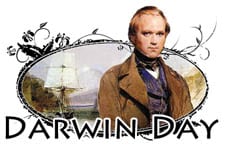“It is not too great an exaggeration to claim that On the Origin of Species was, along with Das Kapital, one of the two most significant works in the intellectual history of the nineteenth century.” – Robert M. Young
Charles Darwin, one of the most important scientific thinkers of all time, was born of February 12, 2009. I wrote the for the 200th anniversary of his birth. Many more important books and articles have been published since then, but these are still essential.
First published in Climate & Capitalism, February 4, 2009
Charles Darwin was born on February 12, 1809, so this year marks the 200th anniversary of his birth — and the 150th anniversary of the publication of his masterwork, On the Origin of Species. Karl Marx called Origin “epoch-making,” and described Darwin’s ideas as “the basis in natural history for our own view.”
Historian Paul Heyer has written (correctly, in my opinion) that “while one can be a Darwinian in biology and reject Marx on the grounds that history is not subject to scientific understanding, a respectable if somewhat limited intellectual position, one cannot proclaim fidelity to the Marxian world view and reject Darwin.” (Nature, Human Nature and Society, p. 27)
And yet, in my experience, socialists who have actually read Darwin — or even read much about him — are a distinct minority in the movement. I want to change that.
I’ve written two short articles for Darwin Day.
- “Charles Darwin: Reluctant Revolutionary” appears in the current issue of the British journal Socialist Resistance.
- “Charles Darwin and Materialist Science” will be published in Socialist Voice on February 6 and in Green Left Weekly on February 9.
But those are just beginning points. There are literally hundreds of books on Darwin available, and almost every publisher is bringing one out for this anniversary year. There’s even a cookbook containing Emma Darwin’s recipes – you won’t learn anything about evolution from it, but it does provide some intriguing insights into the ingredients that were found (and used) in a middle-class Victorian kitchen.
The following are my recommendations of books that I think socialists (and everyone else) should read about the discoverer on Natural Selection. The links are to Amazon, because it is the most widely accessible source, but shop around. (Personally, I always check Abebooks first – if the book is available from any used bookstore anywhere, that site can find it for you.)
Biographies: There are more Darwin biographies in print than anyone could possibly read. A good short overview of Darwin’s life and ideas, and a good place to start your Darwin studies, is A Brief Guide to Charles Darwin, His Life and Times, by Cyril Aydon.
At the other end of the time-to-read spectrum is Janet Browne’s definitive work, published in two volumes: Charles Darwin: Voyaging and Charles Darwin: the Power of Place.
Adrian Desmond & James Moore focus much more on the social context in Darwin: The Life of a Tormented Evolutionist. It’s an important book, but somewhat mechanistic in the way it links Darwin’s ideas to social causes.
The Science: Again, there are many books on this subject, but the one I keep going back to is Ernst Mayr’s What Evolution Is. Not light reading, but a superb presentation of modern evolutionary theory for non-scientists.
Over more than 30 years, Stephen Jay Gould wrote hundreds of popular essays on evolution and related topics: all of his books are worth reading, but a good place to start is The Richness of Life: The Essential Stephen Jay Gould.
And in The Blind Watchmaker, Richard Dawkins utterly demolishes the “intelligent design” argument.
Marxism and Darwin: Chapter Six of John Bellamy Foster’s Marx’s Ecology: Materialism and Nature is essential reading on the relationship between Marxism and Darwinism.
Critique of Intelligent Design: Materialism versus Creationism from Antiquity to the Present, which Foster wrote with Brett Clark and Richard York, also contains a valuable chapter on Darwin. The book as a whole is an excellent, clearly written account of the philosophical issues that underlie the fight between evolution and creationism.
Back to the source. I mention this last, but really Charles Darwin’s On the Origin of Species should be very high on your 2009 reading list. It may be the only great work of science that is also a work of literature.
When Origin was published in November 1859, one of the first people to buy a copy was Friedrich Engels: he read it quickly, and told Marx that the book was “absolutely splendid” — and that should be recommendation enough.



